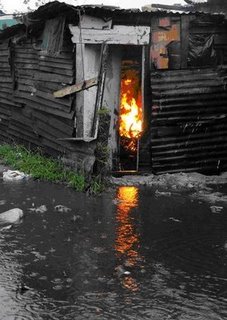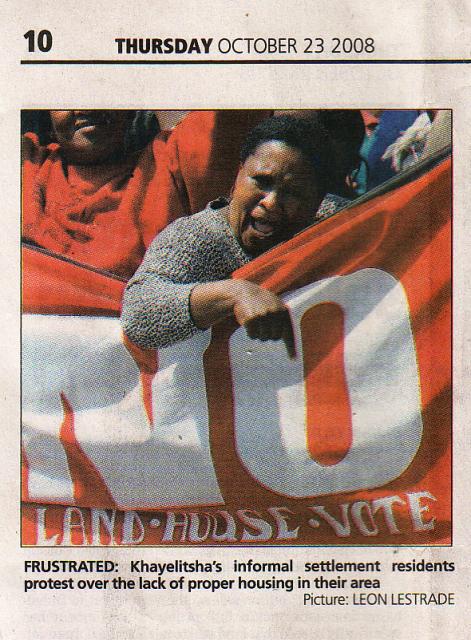Why inequality prevails in Cape Town
By David McDonald
I have been conducting research on the city of Cape Town for the past 15 years. My work has focused primarily on inequality in the city, particularly with regards to basic municipal services such as water, sanitation and electricity.
By some indicators, inequality in Cape Town has improved. There are more people with access to houses, water, healthcare, education and other important amenities – even with a rapidly growing population.
But the story is far from rosy, with Cape Town having one of the worst urban Gini coefficients in the world (a measure that compares income differentials of the richest and poorest).
And if we factor in more difficult-to-measure criteria such as affordability of basic services, time spent travelling on dangerous and unreliable public transport, levels of participation in decision making, stress related to crime, access to green spaces, and mental and physical health then Cape Town’s inequality measures slip further.
On these and many other fronts, Cape Town is one of the most unequal cities in the world. Perhaps the most unequal city in the world.
Why is this? It is due, in part, to what I call a “world city syndrome” – a desire on the part of Cape Town’s politicians, bureaucrats and business elites to make it a “world-class” city which attracts foreign capital and transnational managers in an effort to boost growth and put Cape Town on the international map.
To some extent they have achieved their goals, with Cape Town generally considered to be a world city in the academic literature (albeit a peripheral one).
But herein lies the problem. In the rush to cater to an ever fickle über-elite by spending billions of rand on homogenous social and built environments deemed necessary to be internationally competitive, Cape Town’s decision makers have allocated the lion’s share of the city’s resources for the benefit of a few, leaving two-thirds of the city’s population struggling in varying degrees of poverty.
Cape Town can even be seen as paradigmatic in this regard. Building on the spatial legacies of apartheid, Cape Town has become something of an “ideal” world city, with a high-tech, service-oriented urban core, and a sprawling low-income periphery providing low-wage (and increasingly informal) labour.
These inequities characterise cities throughout Africa, Asia and Latin America, of course, but the highly segregated and racialised nature of Cape Town sets it apart.
Liberal academics lament these inequalities and argue for better regulation of market forces, in the hopes that the social and economic benefits of these global linkages will soon trickle down.
But there is a more critical urban literature which argues that inequality is endemic to market-oriented growth, with private capital interested in little more than building the social and physical infrastructure it needs to perpetuate its own expansion.
The policies used to reinforce these developments are increasingly neoliberal in nature, of the sort that have been championed by the Democratic Alliance and the ANC alike in Cape Town. From privatisation, to prepaid electricity meters, to massive public spending on elite infrastructure projects (think Fifa 2010 or the International Convention Centre), the city has become a neoliberal policy- making machine that rewards those who play the game and disciplines those who do not.
There are alternative development paths to neoliberalism.
Venezuela, Bolivia and a host of other Latin American countries are experimenting with non-market options (with mixed results) and there is growing resistance to neoliberal inequality in cities throughout the world with mounting interest in non-market alternatives.
What can Cape Town do to address these inequalities?
Relatively easy options exist to make the pricing of basic services much fairer, redirecting resources to areas most in need, building low-income housing closer to the city centre, and making local government more accountable and participatory (to name but a few policy choices).
But these Keynesian-welfarist models won’t solve the underlying contradictions of the global market economy. Much further-reaching change will be required in the longer-term if the majority of Capetonians who struggle to get by on a daily basis are to have a sense of belonging and dignity in this city.
These will not be easy choices to make, but as the global financial crisis has made clear, the market is an unreliable and unstable way to allocate resources and different ways of thinking are needed.
# McDonald is associate professor of global development studies at Queen’s University in Canada, and author of World City Syndrome: Neoliberalism and Inequality in Cape Town (Routledge, New York), which will be officially launched tonight at The Book Lounge in Cape Town.
* This article was originally published on page 11 of The Cape Times on October 21, 2008
* http://www.int.iol.co.za/index.php?set_id=1&click_id=124&art_id=vn20081021062307379C101330


